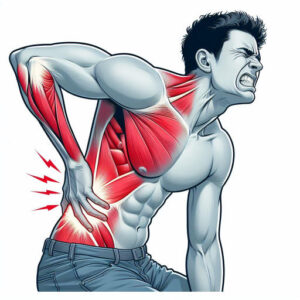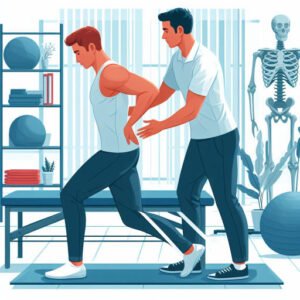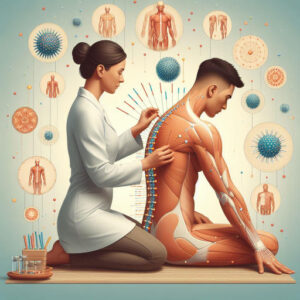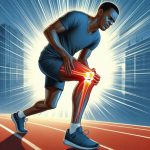Acupuncture can help with back muscle spasms, which are painful and uncomfortable. These spasms happen when the back muscles tense up unconsciously. Overuse, muscular strain, dehydration, and poor posture are potential causes of these spasms. Muscle tension or overstress can lead to back spasms. Muscles are more prone to cramping and spasms when they do not receive adequate water. Back discomfort and spasms are possible outcomes of improper sitting or standing postures, which put undue stress on the back muscles.
The area where a muscle spasm has occurred could feel sharp and painful. Other symptoms include a restricted range of motion and a feeling of tight or knotted muscles. Muscle spasms can cause agonising back pain that can paralyse the afflicted area at times. To avoid further complications, it is essential to treat muscular spasms promptly once they happen. Understanding their causes and symptoms is vital to finding effective treatments for back spasms.
Critical Points to Remember
- Back muscle spasms are involuntary contractions of the back muscles that frequently result from overuse, injury, or poor posture.
- Acupuncture works for back spasms by stimulating the body's natural healing process and promoting blood flow to the affected area.
- The benefits of acupuncture for muscle spasms include pain relief, improved flexibility, and reduced inflammation.
- During an acupuncture session, you can expect to have thin needles inserted into specific points on your body, which may cause a slight tingling or dull ache.
- Other complementary therapies for back spasms include massage therapy, chiropractic care, and physical therapy.
- Maintaining good posture, exercising regularly, and practicing stress-reducing techniques to prevent back spasms are essential.
- When finding a qualified acupuncturist, look for someone who is licenced, experienced, and has a good reputation in the community.
 How Acupuncture Works for Back Muscle Spasms
How Acupuncture Works for Back Muscle Spasms
Using specific points on the body, acupuncture practitioners aim to stimulate energy flow and speed up healing. The needles used in this form of traditional Chinese medicine are extremely fine. Back muscular spasms are often effectively treated with acupuncture. Acupuncture needles are inserted into specific locations along the body's meridians, which are believed to represent pathways for energy flow. You can reduce muscular tension in your back by directing your attention to these areas.
Acupuncture is thought to relieve muscular spasms by stimulating the release of endorphins, the body's natural painkillers. This can reduce the pain and discomfort caused by muscular spasms. Increased blood flow to the wounded region is another way acupuncture speeds healing and decreases inflammation. Acupuncture stimulates specific points on the body to alleviate muscle tension and spasms, bringing the body's energy flow system back into balance.
The Benefits of Acupuncture for Back Muscle Spasms
If you're experiencing muscular spasms, acupuncture may be able to help. One of its key benefits is that it may naturally relieve pain without the need for medication. Acupuncture can alleviate pain and muscular tightness in the back because it releases endorphins. Many folks find that this helps with their muscular spasms.
In addition to potentially reducing pain, acupuncture has the added benefit of increasing the range of motion and flexibility in the back. Acupuncture improves flexibility and range of motion by targeting specific areas of the body to release tension and stiffness. This could be useful for people whose movement has been limited due to muscular spasms.
Lastly, acupuncture is a non-invasive and safe treatment option a qualified practitioner provides. This risk-free and effective alternative is an excellent choice for people who would rather not deal with back spasms using medicine or invasive procedures.
What to Expect During an Acupuncture Session
During the initial acupuncture session for muscular spasms, the acupuncturist will collect a comprehensive medical and symptom history. Based on this data, we can determine how to most effectively alleviate the muscular spasms. The next step is for the acupuncturist to place tiny needles at specific points on the body while the patient relaxes on a treatment table.
In acupuncture, tiny needles are inserted just under the skin's surface. While the needles may provide a tingling sensation for some, acupuncture is generally painless. It is common practice to leave the needles in for at least 20 to 30 minutes following insertion. The patient may feel calm and relaxed as the needles release muscular tension and promote energy flow.
 Other Complementary Therapies for Back Muscle Spasms
Other Complementary Therapies for Back Muscle Spasms
Alternative medicine practices like acupuncture may help alleviate back muscular spasms. Chiropractic therapy is one of various spinal manipulation techniques aimed at realigning the spine and relieving muscular tension in the back. Seeing a chiropractor can help alleviate muscle spasms by realigning the spine and promoting overall spinal health through manual manipulation procedures.
Massage can be quite effective in alleviating muscular spasms as an additional therapy option. Massage therapists use a wide range of methods to reduce tension and anxiety by manipulating the muscles and soft tissues of the body. This treatment is potentially life-changing for those experiencing painful back spasms due to overly tight muscles.
Additionally, those who experience back spasms may find relief via physical therapy. Physical therapists specialise in restoring the range of motion, flexibility, and strength of the back muscles and may craft specialised training programmes for their patients. If you want to maintain a healthy back and prevent muscular spasms, try these exercises.
Tips for Preventing Back Spasms
The two most important things you can do to prevent back spasms are to have a healthy back and avoid pressure on the muscles. Maintaining an upright posture is one way to lessen the chances of experiencing muscular spasms. Additionally, you may reduce the load on your back muscles and prevent stress and spasms by maintaining good posture while sitting, standing, and lifting.
Reminding yourself to drink enough water can help reduce the likelihood of muscular spasms. Muscle spasms and cramps can happen when fluids don't reach the muscles, so staying hydrated is crucial. Additionally, regular exercise may strengthen back muscles and improve flexibility, which in turn reduces the chance of muscular spasms.
You should also get up and move about occasionally rather than sitting for lengthy periods. Getting up and moving about every few hours is a simple way to prevent muscular tension and spasms. Furthermore, maintaining a healthy weight helps alleviate strain on the back muscles, decreasing the probability of experiencing muscle spasms.
 Finding a Qualified Acupuncturist
Finding a Qualified Acupuncturist
Optimal results from acupuncture for back spasms should be achieved by consulting a qualified practitioner specialising in musculoskeletal issues. If you know someone who has had positive results from acupuncture, you might ask them for a referral. Additionally, several professional groups for acupuncture practitioners maintain web directories where clients may find qualified acupuncturists in their area.
Ensure the acupuncturist is up-to-date on their certification and licencing criteria. Consequently, you may believe they are well-educated and consistently deliver excellent results. Patients looking for acupuncture to alleviate back muscular spasms may want to know more about the practitioner's experience and training before scheduling their first appointment.
Finding an acupuncturist who is skilled at relieving back pain requires research and asking the appropriate questions. By finding a trained acupuncturist, patients can gain confidence in their treatment selections and increase their chances of a positive outcome from acupuncture.
Acupuncture may be the answer to your muscle spasms. A recent blog post on the MCR Therapies website claims that acupuncture can effectively treat muscle spasms and enhance general back wellness. Their post is informative if you want to learn more about how acupuncture might help with back pain. Here.
FAQs
What is acupuncture?
Acupuncture, a traditional Chinese medicine, involves inserting very thin needles into certain anatomical points on the body to speed healing and affect energy flow.
How does acupuncture help with back spasms?
When back spasms strike, many people seek treatment through acupuncture. It reduces inflammation, boosts blood flow, and produces endorphins. Muscle relaxation and enhanced performance are two other advantages.
Is acupuncture safe for treating back spasms?
Muscular spasms are usually no big deal in the hands of a trained and licenced acupuncturist. However, seeing a doctor before starting acupuncture treatment is very important if you have any current health conditions.
How many acupuncture sessions are needed for muscle spasms?
Intense back spasms and the patient's response to therapy dictate the number of acupuncture sessions that may be required. Some patients may only need a short course of treatment to start feeling better, while others may require ongoing support.
Are there any side effects of acupuncture for back spasms?
A typical side effect of acupuncture is minor bleeding, bruising, or pain at the injection sites. More severe side effects, such as infection or nerve damage, may occur in rare cases. To minimise the risk of side effects, it is crucial to see an acupuncturist who is both licenced and qualified.
References
- Is Acupuncture Good for Chronic Back Pain? Balance Within Acupuncture & Chiropractic. https://www.balancewithinyou.com/pain/is-acupuncture-good-for-chronic-back-pain/
- Recovering from Injury: 5 simple tips for Health-Changing. https://healthchanging.com/238-2/
- Empowering Recovery: The Role of Physiotherapy in Restoring Health and Mobility Be honest and healthy! https://bahasainggrisoke.com/empowering-recovery-the-role-of-physiotherapy-in-restoring-health-and-mobility/
The post Relief for Back Muscle Spasms: The Benefits of Acupuncture appeared first on Acupuncture Fulwood Preston.
The Article Pain Relief from Back Muscle Spasms: How Acupuncture Can Help appeared first on MCR Therapies.
The Article Pain Relief from Back Muscle Spasms: How Acupuncture Can Help Was Found On https://limitsofstrategy.com


Your post highlights some critical factors surrounding back muscle spasms that many may overlook. Personally, I’ve experienced these spasms and can attest to their debilitating nature, especially following long hours of poor posture at my desk job. I’ve found that not only can acupuncture be beneficial, but incorporating regular stretching and strengthening exercises into my routine has significantly improved my muscle resilience.
You’ve highlighted a struggle that resonates with so many of us. Those long hours hunched over a desk can easily lead to issues that ripple through our bodies, especially our backs. It’s fascinating how our daily habits can have such a profound effect on our health over time, isn’t it? It sounds like you’ve taken some meaningful steps to combat those muscle spasms, and it’s inspiring to hear about your journey.
It really is eye-opening how much our daily routines can shape our health. I’ve definitely felt the effects of those long hours at the desk, particularly with my back and neck. It’s almost like our bodies are trying to send us a message, isn’t it?
It’s really insightful to hear about your experience with back muscle spasms and the impact of posture at your desk job. You bring up a crucial point—how easily poor posture can sneak up on us and lead to significant discomfort. I’ve noticed that many people underestimate how a few simple adjustments, like proper ergonomics at their workspace, can make a difference.
Ah, back spasms—the type of surprise party we never wanted to RSVP to! This is such a relatable issue. I remember the first time I experienced one; it felt like my back was auditioning for a role in a horror film, tightly winding up and dragging my whole day down with it. Between the muscle tension and that delightfully sharp pain, I couldn’t help but wonder if my back was sending me a “you should have stretched” memo I missed.
Your description of back spasms really hits home. It’s wild how something as subtle as a wrong twist or an awkward long sit can turn our bodies into a scene straight out of a thriller. I can only imagine my back giving me that “you should have stretched” memo too—if only I had an extra set of ears to hear it!
I totally relate to that feeling. It’s so easy for a minor misstep or an extended sit to spiral into a full-on back spasm. I think it’s part of our modern lives, where we often find ourselves hunched over screens for too long or reaching awkwardly for something just out of reach. I’ve had my share of moments where my back definitely had strong opinions on my choices.
It’s interesting how our bodies can pull these surprise stunts on us without any warning, isn’t it? Your description of that back auditioning for a horror film really resonates—sometimes it feels like they have their own agendas. I’ve had my share of back spasms, too, and it always makes me reflect on how much we take our physical health for granted until something goes awry.
It’s fascinating how our bodies can turn into these unpredictable actors in our life’s play, isn’t it? Those surprise back spasms really do feel like a scene straight out of a horror flick, catching us off guard when we least expect it. It’s almost as if our bodies communicate in their own quirky way, reminding us to slow down and listen more closely.
It really is fascinating how our bodies operate behind the scenes, isn’t it? Those surprise back spasms can certainly feel like an unwelcome plot twist in our daily lives. I’ve experienced moments where I’m fully engrossed in something—work, a hobby, or even just relaxing—only to suddenly feel my body reminding me to take a break. It’s like a nudge from within, pushing us to pay attention to what we often overlook.
You really hit the nail on the head with that observation. It’s interesting how our bodies have their own way of communicating with us, often at the most inconvenient times. Those surprise back spasms can feel like a sudden interruption in our day, can’t they?
It really is fascinating how our bodies can catch us off guard. I think a lot of us walk around feeling invincible, until something like a sudden back spasm hits us. It’s almost humbling in a way, reminding us of our limitations. I’ve had my moments too—there’s something about those unexpected twinges or spasms that feels like our bodies are trying to communicate, even if it’s a bit dramatic.
You’ve painted quite the vivid picture of those back spasms—it really does feel like our bodies are staging their own little horror show when they decide to misbehave. That experience of having everything just freeze up can really throw a wrench in our plans, can’t it? I’ve had my share of those moments, too, where I couldn’t help but wonder if my back was staging a protest over my lack of stretching or perhaps my long hours hunched over a desk.
It’s interesting how our bodies communicate with us, isn’t it? That feeling of everything just freezing up during a back spasm can feel like your own body is staging a revolt, and it definitely puts a damper on whatever plans you might have had. I can relate to those moments of being hunched over a desk, lost in work, and then suddenly being jolted back to reality when my back reminds me it’s had enough.
I can definitely relate to that feeling. It’s almost strange how our bodies have their own way of telling us to slow down. I’ve experienced those sudden back spasms too—one moment I’m deeply focused, and the next, I’m contorted in discomfort. It really makes you rethink how we approach our work and daily routines.
Speaking of our bodies staging little protests, I recently came across some interesting insights on how hijama therapy can help relieve those stubborn aches and promote overall well-being.
‘Hijama Wet Cupping Therapy: Discover Its Essential Benefits’
https://soonrs.com/hijama-wet-cupping-therapy-discover-its-essential-benefits/.
It’s interesting how our bodies often act as a barometer for our stress levels and overall well-being. Those sudden back spasms can be quite jarring, especially when you’re lost in the flow of a task. It’s a stark reminder that we’re not just mindless machines; we’re living systems that need attention and care.
It’s interesting to hear that you can relate. Those unexpected moments when our bodies demand attention can feel jarring, can’t they? It’s like a wake-up call, reminding us that staying in tune with ourselves often gets overshadowed by our daily grind. Many of us push through discomfort, thinking it’s just part of the hustle. But when our bodies protest in such striking ways—like back spasms—it really does force us to reconsider our routines.
It’s fascinating how our bodies try to communicate with us in such vivid ways, isn’t it? Those abrupt moments of discomfort can really catch us off guard and serve as a powerful reminder to reassess our daily habits. The tension we feel often signals that it’s time to step back and really listen to what we need.
It really is fascinating how our bodies have their own way of signaling what they can handle, isn’t it? I’ve definitely had those moments where I’m deep into a project, just pushing through, and then suddenly it’s like my back says, “Not so fast.” It can feel frustrating, especially in a society that often praises hustle and constant productivity.
It’s true that our bodies often have a way of communicating limits, especially when we’re focused on a project. That sudden reminder from your back can feel like an unwelcome interruption, but it’s also a signal worth paying attention to. We live in a culture that celebrates non-stop hustle, which often leads us to push through discomfort or fatigue without stopping to consider the consequences.
I can really relate to that “horror film” moment. It’s incredible how something like back spasms can feel so dramatic and unexpectedly disruptive. It’s like our bodies have a way of reminding us that they have their own agenda. That internal “you should have stretched” memo could definitely come with a little more clarity.
I hear you on that! It’s wild how our bodies can turn a simple moment into a scene straight out of a horror film. Those back spasms really do have a way of catching us off guard, reminding us that we can’t always control what’s happening. It’s like our muscles have their own secret language, sending those “you should have stretched” notes at the most inconvenient times.
It’s interesting, isn’t it? The way our bodies can throw a curveball at us when we least expect it. That feeling of back spasms is like an unexpected plot twist in a film that just shifts everything around. You’re going about your day, and suddenly, you’re reminded that your body has its own intricate communication system. I’ve had those moments where it feels like my back is staging a protest, and everything I had planned just shifts dramatically.
You’re spot on about that “horror film” moment—it’s wild how a back spasm can flip your day upside down. One minute you’re fine, and the next, it feels like your body is auditioning for a thriller. It’s frustrating when your own muscles decide to throw a surprise party without an invite.
You’re spot on about back spasms being that unwelcome surprise party—definitely not the kind of fun we sign up for. It’s like they wait for the worst moment to crash in, almost as if our backs thrive on drama! I can relate to that horror movie vibe; sometimes, it feels like my lower back is trying to pull off its own twist ending when I least expect it.